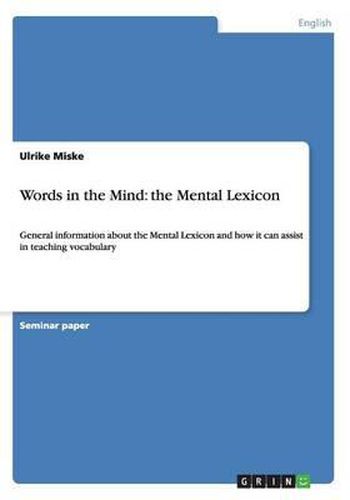Readings Newsletter
Become a Readings Member to make your shopping experience even easier.
Sign in or sign up for free!
You’re not far away from qualifying for FREE standard shipping within Australia
You’ve qualified for FREE standard shipping within Australia
The cart is loading…






Seminar paper from the year 2005 in the subject English Language and Literature Studies - Linguistics, grade: 1,3, University of Paderborn, course: Vocabulary Teaching, 13 entries in the bibliography, language: English, abstract: Words are considered the basis - possibly the most important factor - when learning a new language. In order to make yourself understood, it is essential to know a wide range of words. Every learner of a foreign language knows the challenge of learning vocabulary items by heart. At times, coping with a certain amount of words can be a rather difficult or even frustrating task for the individual learner. This is where the foreign language teacher is supposed to step in and assist the students in their learning process by providing relevant learning material. First of all, however, the language teacher needs to be aware of the different physical and psychological prerequisites of the students. One very important question to ask is: where in the brain are vocabulary items stored? A good knowledge about the procession of new incoming data can help the language teacher to draw helpful conclusions to facilitate language learning. In fact, students will find it easier to learn new items if the teacher takes into consideration how the mind functions. Although, of course, not all students have the same approach to learning and might have different learning styles. Still, if there is a universal principle for processing concepts, this should not be neglected. Linguists have started to use a variety of other terms such as concept or vocabulary item to avoid the use of word. It is necessary to know that words in the mind always include a certain view of the world, which is better rendered by the term concept or (vocabulary) item. In the this paper, I will discuss the processing of words in the Mental Lexicon and show how it can help to teach vocabulary items to students. First of all, I will give a definition of the term Mental Lexicon a
$9.00 standard shipping within Australia
FREE standard shipping within Australia for orders over $100.00
Express & International shipping calculated at checkout
Seminar paper from the year 2005 in the subject English Language and Literature Studies - Linguistics, grade: 1,3, University of Paderborn, course: Vocabulary Teaching, 13 entries in the bibliography, language: English, abstract: Words are considered the basis - possibly the most important factor - when learning a new language. In order to make yourself understood, it is essential to know a wide range of words. Every learner of a foreign language knows the challenge of learning vocabulary items by heart. At times, coping with a certain amount of words can be a rather difficult or even frustrating task for the individual learner. This is where the foreign language teacher is supposed to step in and assist the students in their learning process by providing relevant learning material. First of all, however, the language teacher needs to be aware of the different physical and psychological prerequisites of the students. One very important question to ask is: where in the brain are vocabulary items stored? A good knowledge about the procession of new incoming data can help the language teacher to draw helpful conclusions to facilitate language learning. In fact, students will find it easier to learn new items if the teacher takes into consideration how the mind functions. Although, of course, not all students have the same approach to learning and might have different learning styles. Still, if there is a universal principle for processing concepts, this should not be neglected. Linguists have started to use a variety of other terms such as concept or vocabulary item to avoid the use of word. It is necessary to know that words in the mind always include a certain view of the world, which is better rendered by the term concept or (vocabulary) item. In the this paper, I will discuss the processing of words in the Mental Lexicon and show how it can help to teach vocabulary items to students. First of all, I will give a definition of the term Mental Lexicon a